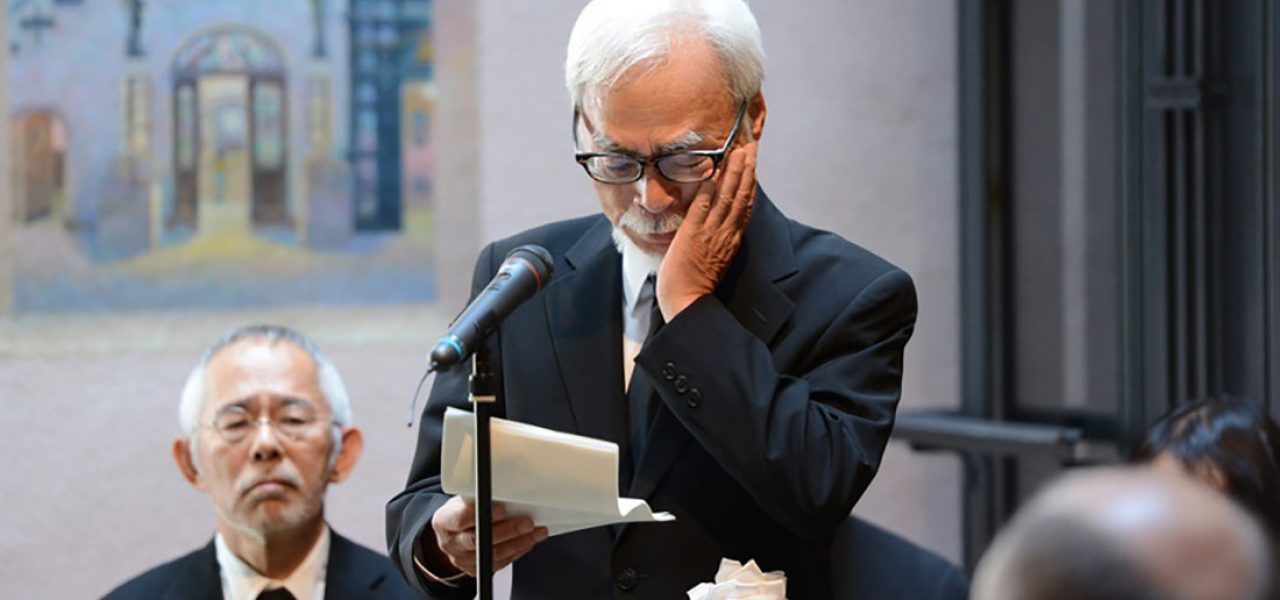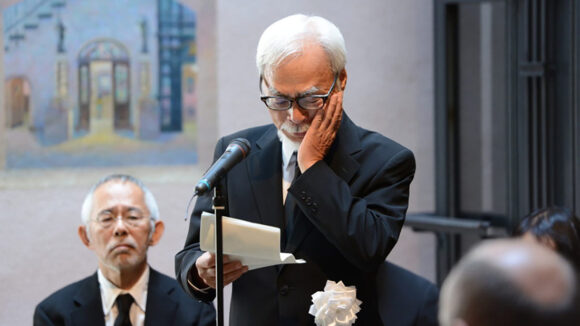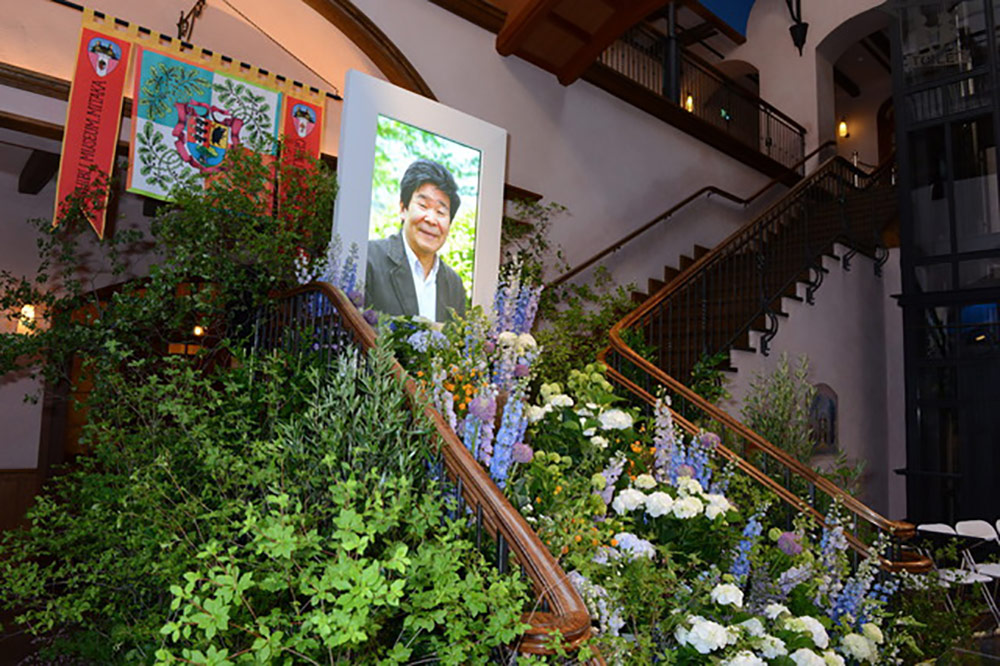

Watch Hayao Miyazaki’s Eulogy For Isao Takahata
On Tuesday, Studio Ghibli held a memorial service at the Ghibli Museum for director and studio co-founder Isao Takahata, who passed away last month at the age of 82.
A who’s who of the film and animation community showed up at the private memorial service including Yoshiyuki Tomino (Mobile Suit Gundam), Yōji Yamada (Otoko wa Tsurai), composer Joe Hisaishi, animators Yasuo Otsuka and Yôichi Kotabe, and The Red Turtle director Michael Dudok de Wit.
All eyes however were on director and Ghibli co-founder Hayao Miyazaki, who delivered his first public words about Takahata’s passing at the memorial. It’s an amusing speech in which Miyazaki explains why Takahata’s nickname was Mr. Munch. He also drops in some black comedy by explaining how he convinced Takahata to quit smoking, only to then tempt him by purposely smoking in front him. Takahata’s cause of death was lung cancer.
Miyazaki’s eulogy can be seen below with English subtitles:
A significant portion of Miyazaki’s eulogy, in which he speaks of their experience working on The Great Adventure of Horus, Prince of the Sun (1968), has been edited out of the above video, but the full text can be read below:
[We call Takahata-san by his nickname “Paku-san.”] Actually, I’m not really sure where it came from. He always had trouble waking up in the morning. When he started working in Toei Douga [or Toei Animation], he would often rush into work at the last minute. After punching in, he would munch [“paku-paku” means “munch munch” in Japanese] the bread he had brought, and drink some water directly from the tap. Supposedly that’s the reason for his nickname: “Paku-san”.
This might not sound like an eulogy, but please allow me to read what I wrote. Paku-san was taking it for granted that he wouldn’t die before the age of 95. But, he passed away [at age 82, which was earlier than he’d expected, after all]. I realize that I don’t have much time left, too.
Nine years ago, I got a phone call from the doctor of both of ours. He said “If you are his friend, talk him into giving up smoking” with a serious and severe tone of voice. I was overwhelmed by his spirit. Suzuki-san [Studio Ghibli’s producer] and I sat across from Paku-san at a table. I was sitting straight up. That was my frist time talking to him that way. “Paku-san, quit smoking, please,” I said. “Please quit smoking for the sake of work.” Suzuki-san said. We had been prepared for a flood of excuses and objections from him, but he just said “Thank you very much. I’ll quit” and bowed to us.
Eventually, he gave up smoking cigarettes for real. Once, I came up to him and intentionally smoked a cigarette. He said, “I think it smells good, but I’ve grown not to crave cigarettes at all.” He was in a different league than me as a man. I realized he would surely live until 95 years old, after all.
In 1963, we first met each other. Paku-san was 27 and I was 22, back then. I still remember the day when we exchanged words for the first time. I was waiting for the bus bound for Nerima at a bus stop in the twilight. A young man approached me walking down the street where some puddles remained right after it rained. “I heard you are meeting up with Segawa Takuo-san.” In front of me was the gentle and wise looking face of a young man. That was the moment when I first met Takahata-san, also known as Paku-san. I wonder, why do I still remember that this clearly, even though it was 55 years ago? I can even vividly remember the look on his face at that time.
The next time I saw Paku-san was when I was pushed into a member of the board of Toei Douga Labor Union. Before we knew that, he was put in the vice chairman and I was put in the secretary general. I started struggling with the days where I was sick to my stomach because of pressure. I would stay over in the shack as the union office and be absorbed in talking with Paku-san till dawn, about everything, especially our works. We were never satisfied with our work. We wanted to go further and deeper. We wanted to work for something we could really be proud of, but we didn’t know what we should make, and how. His literacy really blew my mind. I was so glad that I got to encounter a man of such rare intellect.
The production [of The Great Adventure of Horus, Prince of the Sun as Takahata worked as its screenwriter] did not proceed well. The staff were not familiar with [Takahata’s] new style. The progress was so slow that the project became a headache to the entire company. Paku-san was an incredible persistent guy. Even as the company’s top management tried to change his direction with, sometimes, threats and, sometimes, begging, he did not change. I worked by myself over weekends with no AC in the summer, drawing the sketches for the background pictures on big sheets of paper. The agreement with the labor’s union did not allow the work on weekends but I did not care. It was so simple. I just did not punch the time card for the weekend work.
After I watched the first version [of The Great Adventure of Horus] I could not move. It was not that I was moved, but I was totally taken by surprise. I was aware of the dispute over the scene of “Mayoi no Mori/The Enchanted forest” as to whether it should have been edited out or not. Paku-san negotiated with the company board patiently and he had no choice, but had to agree on the number of the animation frames and the number of work days to the deadline. Of course, he could not keep the agreement. More frame and more days cost. Every time he broke the agreement, he had to write an apologetic letter [to the company]. I wonder how many letters he had to write. I was also fully tied up with my own job and I could not help him in that tough fight.
I watched the scene with Hilda in the Enchanted forest at the first test screening. The overwhelming expression and the pictures! And so much love! I came to understand for the first time that this was what Paku-san wanted to create. He completed the work. It was in year 2000, thirty years after the release [of that film], that Paku-san suggested having a gathering inviting the crew. From the person in charge [of the film], the board members, the managers who were pressed between the people on the work field and the top members in that company (Toei Animation), production manager, illustration staff, the females who worked on the background and coloring to the staff in film shooting, recording, and editing, so many people came. The film was not financially successful, but nobody cared about it any longer.
Paku-san, in those days, we were living with all of our might. You stood tall without bending to any hardships. This was an attitude we all shared. Thank you, Paku-san.
55 years ago…I’ll never forget about the first time you talked to me at the bus stop after it rained. Thank you very much.
[Note: The translation for the part of Miyazaki’s eulogy that is not in the video was taken from this website.]

